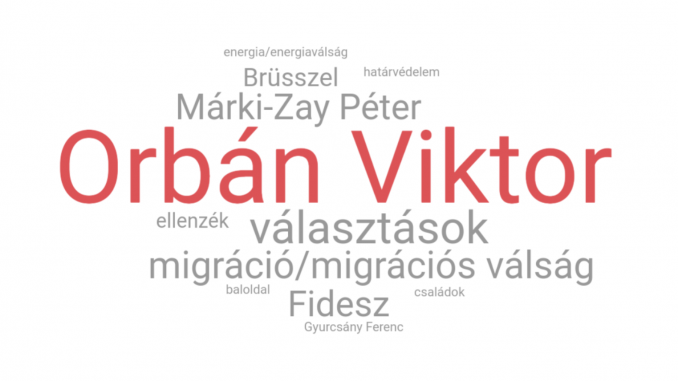
The election campaign officially started in Hungary on the fiftieth day before the announced parliamentary elections, i.e. on 12 February, but based on the press releases of recent months both the government and the opposition had also seized every opportunity to draw attention to the importance of the elections to be held on 3 April. But while we could witness a series of carefully crafted and coordinated campaign series designed by the current Fidesz-KDNP government making use of its absolute media dominance, the six parties that had entered into an alliance in United for Hungary got much less publicity.
Briefly about the methodology and numbers
During the months before the start of the official campaign, we monitored nine Hungarian media outlets in Vojvodina: the website or the online archive of the Magyar Szó Online, the Szabad Magyar Szó, the Vajdaság Ma, the Pannon RTV, the Hungarian news website of the Vojvodina TV channel, the Délhír, the Autonómia, the Hét Nap and the Családi Kör. The observed period ranged between 1 October 2021 and 12 February 2022. During this time, nearly seven hundred news, reports, interviews or notes appeared that directly or indirectly concerned the Hungarian elections and their participants.
77% of the articles appeared in the media financed by the Hungarian Government via the Bethlen Gábor Alapkezelő Zrt. (BGF) Fund and within this number in 73% of the cases, they used as sources the news provided by the Duna Médiaszolgáltató and the KESMA serving the narrative of the Government. 70% of them featured the members of Fidesz, the Hungarian Government and the members of Parliament, and the news was all neutral or positive in 99% of the cases and only 1% had a negative tone. In contrast, 14% of the news spoke about the opposition alliance and its members out of which 39% were explicitly negative and the rest neutral. There was no positive news about the opposition in the media financed by the Hungarian Government.
The Hungarian media space in Vojvodina
A part of the Hungarian press in Vojvodina is significantly dependent on the support of the Hungarian Government. The National Council of the Hungarian Ethnic Minority (Magyar Nemzeti Tanács – MNT) is founder or co-founder of the Magyar Szó, the Hét Nap and the Pannon RTV. These mediums as well as the privately founded Vajdaság Ma received grants amounting to HUF 5.3 billion (EUR 15 million) between 2011 and 2021 via the BGF. And their attachment to the Hungarian Government can also be felt in their media content. Among the many positive pro-government news, they censored the corruption scandals surrounding some Fidesz-KDNP officials or the Pegasus case. This suggests that with the funding of the Hungarian Government and the reliance on the news sites, the Hungarian mainstream press in Vojvodina also adopts the public discourse of the Hungarian government’s political narrative. The news appear in a context that is highly comfortable for the Hungarian Government. At the same time, the outlets try to withhold the embarrassing topics if this suits the Hungarian Government better.
The other five media outlets do not receive direct grants from the Hungarian Government. We can say about the three news portals (the Szabad Magyar Szó, the Délhír and the Vojvodina TV) that they rely on the MTI news to a much smaller extent than the pages financed by the BGF. Typically, they are either supplemented with news from other sources or the information is provided much more briefly. But since these media outlets, due to their moderate resources account for only 23% of the total analysed media content, the prevalence of the pro-government press is quite striking.
We can’t speak about quality information without the proper context
The Hungarian press in Vojvodina has also started to use as a news source the social media posts of public actors, promoting their success propaganda, which they publish without any criticism or counterarguments, we ask ourselves the question about where the boundary is between neutral information and the propaganda rendering media pluralism impossible. According to Norbert Sinkovics, a media expert one can hardly expect any politician not to be biased when speaking about his own or his party’s performances. However, it is the journalist’s job to try to point out the truth of any statement and the background of the problem.
– The lack of proper context is a major threat to quality information, as the journalists’ work complies with the journalism code of ethics only if they can ask questions and show how accurate the politicians’ statements are or if they can interview others stating the contrary to what the public figure claims. A serious problem is that a significant number of journalists do not have this critical reflex towards information provided by politicians nor even institutions. It has become the norm for these posts to be published without any background information, thus allowing space for campaign activity outside the campaign period. This phenomenon is well known in Serbia, but in my opinion it is a very bad media reflex if the news always equals what a politician says to the journalist and not what the reality is. – the media expert summarised.
Translation: Auguszta Szász. Original article, in Hungarian, is available here.
This article is part of our project aiming to monitor the 2022 parliamentary elections in Hungary. The project was funded in part by a grant from Investigative Journalism Europe (IJ4EU) and a grant from the United States Department of State. The opinions, findings and conclusions stated herein are those of the author[s] and do not necessarily reflect those of the funders.
The English translation has originally published here.